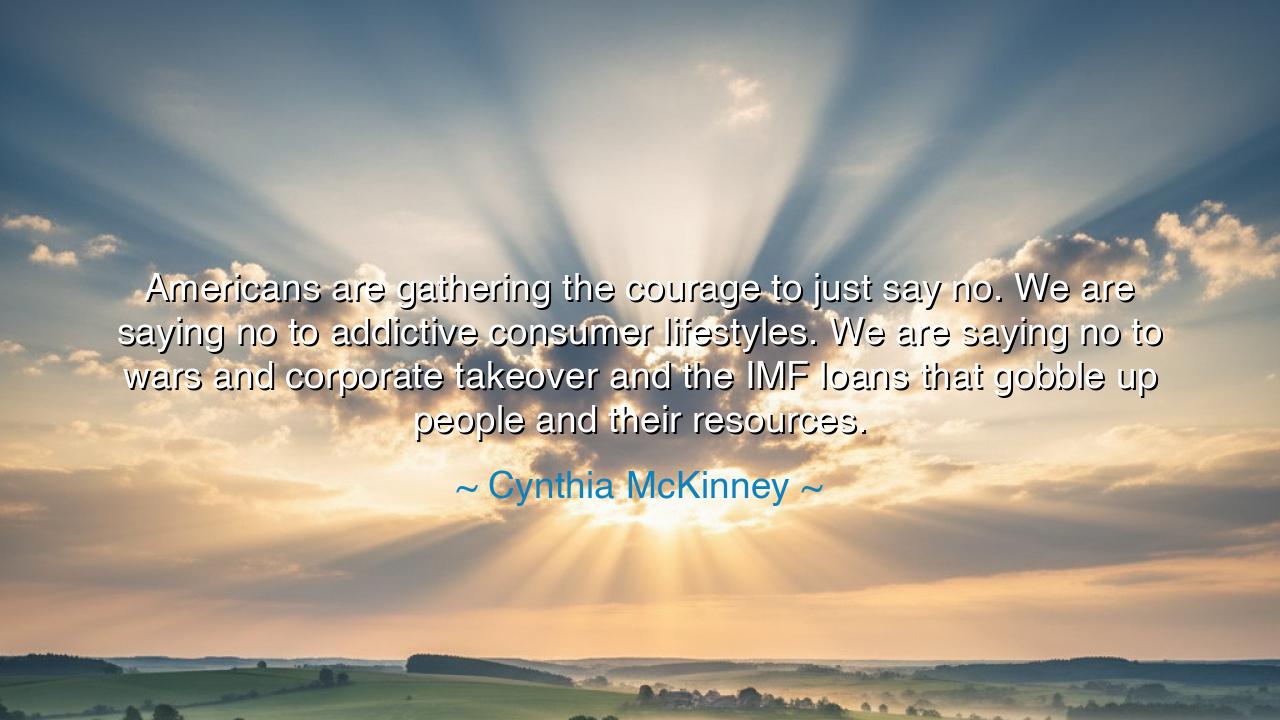
Americans are gathering the courage to just say no. We are saying
Americans are gathering the courage to just say no. We are saying no to addictive consumer lifestyles. We are saying no to wars and corporate takeover and the IMF loans that gobble up people and their resources.






The courageous Cynthia McKinney, a voice of defiance in an age of complacency, once declared: “Americans are gathering the courage to just say no. We are saying no to addictive consumer lifestyles. We are saying no to wars and corporate takeover and the IMF loans that gobble up people and their resources.” In these words, she speaks not merely as a politician, but as a seer of conscience, summoning the spirit of resistance that sleeps in the heart of every free people. Her cry is not one of anger, but of awakening—a call for the soul of a nation to remember its dignity, to rise above greed and fear, and to reclaim its sacred right to say no when the world demands its submission.
The meaning of her words runs deeper than protest; it is a meditation on freedom itself. To “just say no” is to reclaim power from the forces that seek to enslave the spirit. McKinney speaks of addictive consumer lifestyles, the endless hunger for possessions that never fill the emptiness of the soul. She names the great seducers of the modern age—war, corporate conquest, and the economic chains of debt—and calls upon her people to reject them. Her vision is not of rebellion for its own sake, but of liberation, a turning away from false gods toward what is real: community, justice, and peace. For she knows that to resist corruption is not merely political; it is spiritual. It is the soul’s refusal to be bought.
The origin of her conviction lies in a long lineage of those who dared to defy empires. McKinney’s cry echoes the voices of prophets and reformers across centuries—voices that said no when the world bowed in silence. It recalls Mahatma Gandhi, who said no to colonial exploitation; Rosa Parks, who said no to segregation; Nelson Mandela, who said no to injustice; and countless unnamed souls who stood their ground against systems designed to crush them. Like them, McKinney calls for a moral awakening—a courage born not of anger, but of clarity. She recognizes that tyranny, whether political or economic, thrives only when the people’s will is numbed by comfort and consumption.
To understand her warning about consumer addiction, one must look to the age we live in—a world where desires multiply faster than satisfaction. The machinery of profit feeds on the illusion that happiness can be purchased, that self-worth can be measured in possessions. But McKinney sees through this mirage. She knows that every moment spent chasing false desires is a moment stolen from true life. She calls for a return to simplicity, to conscious living, where wealth is measured not in what we own, but in what we contribute to the world. The refusal she speaks of is not ascetic rejection—it is the restoration of balance between body, soul, and earth.
Her condemnation of war and corporate takeover strikes at the heart of modern civilization’s contradictions. In the name of progress, nations have unleashed destruction; in the pursuit of profit, they have enslaved entire peoples. McKinney’s words burn with righteous fire against the IMF loans and global systems that devour the labor of the poor while enriching the powerful. She unmasks these as forms of quiet violence—wars not waged with weapons, but with contracts, currencies, and laws. Her call is for a new kind of revolution: not of blood, but of conscience. To say no to exploitation is to say yes to the dignity of all humankind.
Consider the example of Iceland in the years after the great financial collapse of 2008. When the banks that had gambled away the nation’s wealth demanded that the people bear the cost, the citizens refused. They said no to debt that was not their own, and in that act of defiance, they reclaimed their democracy. McKinney’s vision finds living proof in such acts—the power of ordinary people to resist systems that profit from their submission. Her message is not despair, but empowerment: that a nation, like an individual, is never powerless when it has the courage to refuse.
The lesson, then, is this: to say no is not to withdraw from the world, but to purify it. The act of refusal is the seed of renewal. Every generation must find the strength to reject the lies that seek to bind it—the false promise of endless growth, the glamour of violence, the seduction of greed. Each of us must look inward and ask: what have I accepted that does not honor life? And having seen it, we must have the courage to turn away. For as McKinney teaches, only those who can say no to corruption can truly say yes to truth.
So let this teaching be passed down: freedom begins with refusal. To live consciously, to resist injustice, to choose love over profit and peace over conquest—these are not luxuries, but duties. When a people find the courage to reject what is false, they awaken what is eternal. As Cynthia McKinney proclaims, the power to transform the world begins in the simple, sacred word no—a word that, when spoken in truth, becomes the loudest yes to the future of humanity.






AAdministratorAdministrator
Welcome, honored guests. Please leave a comment, we will respond soon